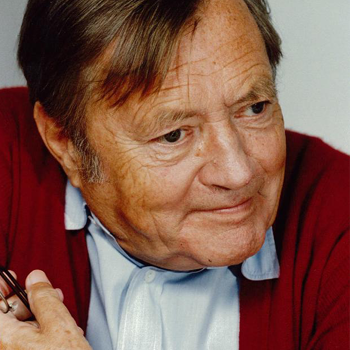Rudolf Augstein was one of Germany’s most famous and respected journalists. As the founder of the weekly news magazine, Der Spiegel — dubbed by Augstein the Sturmgeschütz der Demokratie (the heavy artillery of democracy) — his contribution to the defence and promotion of press freedom in Germany has been significant. Launched in the period immediately after World War II, the magazine quickly established itself as one of the country’s most important publications, uncovering numerous cases of government corruption and incompetence, many of them sending shockwaves through the country.
Rudolf Augstein was born November 5, 1923, in Hanover, Germany. At an early age, he displayed a keen interest in politics when he raised doubts about the likelihood of a German Endsieg (final victory) in a school essay. After graduating from gymnasium in 1941, he worked as a volunteer for the newspaper Hannoverschen Anzeiger before being drafted into the army and sent to the eastern front. He was detained as a prisoner of war by the U.S. forces in 1945 and began his career in journalism that same year with the Hannoverschen Nachrichtenblatt.
Augstein moved to the weekly newsmagazine Diese Woche shortly after it was launched by the occupying British military on November 16, 1946. At age 23, Augstein was considered politically untainted and was named publisher and editor-in-chief. The magazine first appeared under its new name, Der Spiegel (The Mirror), on January 4, 1947. It soon gained a reputation as one of the best independent news magazines in Europe, renowned for its aggressive investigative reporting and well-written exposés on government malpractice and scandals.
A continuing exposé in 1962, revealing the financial problems of the German armed forces, led to Augstein’s arrest and detention on suspicion of treason. The articles involved the minister of defence, Franz Josef Strauss, and implied that the German army would be unable to defend the country against a Communist attack, although huge sums of money were being spent on defence. On October 26, 1962, in a sudden operation, some 60 federal police searched and sealed off Der Spiegel’s offices in Hamburg and arrested three of the magazine’s staff. Conrad Ahlers, the defence specialist of Der Spiegel and later a government spokesman, was arrested while on holiday in Spain, at the request of the German police. On October 27, Augstein turned himself over to the authorities.
The police action followed the publication of an article, written by Ahlers, about a secret NATO exercise, “Fallex 62.” In the article, the magazine alleged that the Western Alliance was reckoning on deaths and casualties of up to 15,000,000 civilians in Germany and Britain in the event of an atomic war and that preparations in West Germany fell far short of requirements.
Augstein’s arrest resulted in worldwide protests and condemnation. In a statement issued on October 30, 1962, IPI said “that the unusual methods employed by the police on this occasion have interfered with the production of the magazine to an extent which goes far beyond anything called for by the incriminating article. … It would appear that the democratic principle of the freedom of the press has been disregarded in the determination to investigate an alleged criminal action.” The German public, worried about the state of democracy in their country, took to the streets on behalf of Augstein and in the name of press freedom. The police action in the so-called Spiegel Affair so shook public opinion that defence minister Strauss had to resign from the cabinet in December 1962.
Although Der Spiegel was able to bring out the following week’s issue by using alternative printing methods, Augstein was detained for 104 days and released in February 1963. The case against him was finally dropped on May 14, 1965, after the accusations against him proved unfounded.
Today, Der Spiegel is a journalistic power. Its exhaustive coverage and analysis of news events and its concise writing have won it widespread respect and one of Europe’s biggest circulations — it sells more than one million copies each week. Augstein, who continued to write his famous, hard-hitting columns almost until his death, was named Journalist of the Century in a December 1999 survey of 100 prominent German journalists. He introduced a new style of investigative journalism to Germany and shaped public opinion in the Federal Republic for more than five decades.
Rudolf Augstein died from pneumonia on November 7, 2002, aged 79.
From Our Archive:
IPI statement following Augstein’s arrest.
“It would appear that the democratic principle of the freedom of the press has been disregarded in the determination to investigate an alleged criminal action.”
